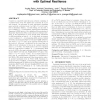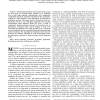5 search results - page 1 / 1 » On Expected Constant-Round Protocols for Byzantine Agreement |
CRYPTO
2006
Springer
13 years 8 months ago
2006
Springer
In a seminal paper, Feldman and Micali (STOC '88) show an n-party Byzantine agreement protocol tolerating t < n/3 malicious parties that runs in expected constant rounds. H...
PODC
2009
ACM
14 years 5 months ago
2009
ACM
Consider a completely asynchronous network consisting of n parties where every two parties are connected by a private channel. An adversary At with unbounded computing power activ...
STOC
2006
ACM
14 years 5 months ago
2006
ACM
We present a randomized Byzantine Agreement (BA) protocol with an expected running time of O(log n) rounds, in a synchronous full-information network of n players. For any constan...
TDSC
2011
12 years 11 months ago
2011
— Randomized agreement protocols have been around for more than two decades. Often assumed to be inefficient due to their high expected communication and computation complexitie...
DSN
2006
IEEE
13 years 10 months ago
2006
IEEE
Randomized agreement protocols have been around for more than two decades. Often assumed to be inefficient due to their high expected communication and time complexities, they ha...



